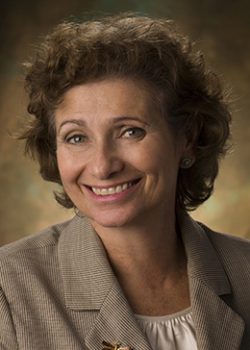- Medical Professionalism
- The Physician Charter
- Building Trust
- Health Equity & Inclusion
- Choosing Wisely®
- Grants
- ABIM Foundation Forum
- 2025 Reimagining Professionalism: Hope in a Shifting Medical Landscape
- 2024 Being a Trustworthy Professional in an Untrusting World
- 2023 Reframing Trust – A Path to Address Misinformation
- 2022 Fact or Fiction – Strategies for the Misinformation Age
- 2021 Pursuing Trust – Striving for Equitable Health Care
- 2020 Building Trust & Health Equity
- 2019 [Re]Building Trust – A Path Forward
- 2018 [Re]Building Trust

Calling a Truce On Physician-To-Physician Incivility To Avoid Burnout
November 18, 2016
Ellen Friedman, MD is Professor of Otolaryngology and Director for the Center for Professionalism in Medicine at the Baylor College of Medicine.
“Subspecialization in medicine and technologies continues to evolve, resulting in an increase in physicians’ interdependence on one another. This is not a new problem. As noted by Dr. William J. Mayo in a commencement speech he gave at Rush College in 1910, “As we grow in learning, we more justly appreciate our dependence upon each other. The sum-total of medical knowledge is now so great and wide-spreading that it would be futile for one man to attempt to acquire, or for one man to assume that he has, even a good working knowledge of any large part of the whole. The very necessities of the case are driving practitioners into cooperation. The best interest of the patient is the only interest to be considered, and in order that the sick may benefit of advancing knowledge, union of forces is necessary.”
While the importance of collaboration among physicians is not new, many challenges in the professional environment have emerged, including:
- mandatory treatment guidelines,
- productivity requirements,
- reimbursement issues, and
- the electronic medical record.
Daily struggles with these realities can cause physicians to become less engaged, even cynical or demoralized. Physicians can feel alone in the pursuit of excellence, at times even victimized by the system. The breakdown of morale of the medical staff has many ramifications, including the widely publicized epidemic of burnout.
The feelings associated with burnout may feel familiar: We may have difficulties living up to our own expectations of professionalism, which can contribute to becoming impatient with consultants or being easily annoyed by the primary team, and thus communication breakdowns may occur. Common courtesy among colleagues is often lacking.
Physician-to-physician conflicts resulting, in part, from burnout threaten patient safety by limiting cooperation and communication among care team members. A study by the Institute of Medicine points to poor communication and deficient teamwork as common causes of adverse patient outcomes, even more common than lack of knowledge or clinical skills. Conversely, the benefits of improved teamwork exceed purely patient-centered benefits; it also creates a more satisfying and pleasant work environment for physicians, which, in turn, helps to combat burnout. While I certainly applaud kindness to patients, kindness to colleagues is almost of equal importance, yet is infrequently discussed.
Although as physicians we may feel powerless to reverse many of the negative aspects of the march toward the commercialization of medicine, we can personally address our own ability to communicate respectfully to one another. This will improve our connection and engagement to our colleagues. How to begin?
- Make the decision to be the first to pursue a gentler, kinder approach to your colleagues.
- Renew your empathy by believing that everyone comes to work to do a good job because, in the vast majority of cases, that is true.
- When you encounter an individual with whom you have conflicts, remember that all of the unpleasant factors that are challenging and frustrating you are also challenging him or her. In fact, your colleague even could have additional undisclosed distressing personal issues.
- Recall that while you are dealing with well-intentioned educated colleagues with different training, different expertise and different points of view, you also have a shared desire to help the patient.
- Remember that your words are powerful and that in each verbal or digital interchange, you can choose to use that opportunity to be respectful, kind and encouraging instead of confrontational, condescending or negative.
If you make a daily effort to extend empathy to your colleagues, it is highly likely that your positive approach will be contagious. The benefits will be felt and appreciated by your patients, your team members and you. You could be the beginning of a mini–cultural revolution! Let’s call for a truce on physician-to-physician conflicts and focus our energy to improve respectful communication. This cease-fire will strengthen our professional identity and provide us with greater job satisfaction and the resilience necessary to combat burnout during these challenging times while simultaneously benefiting patient safety.”

